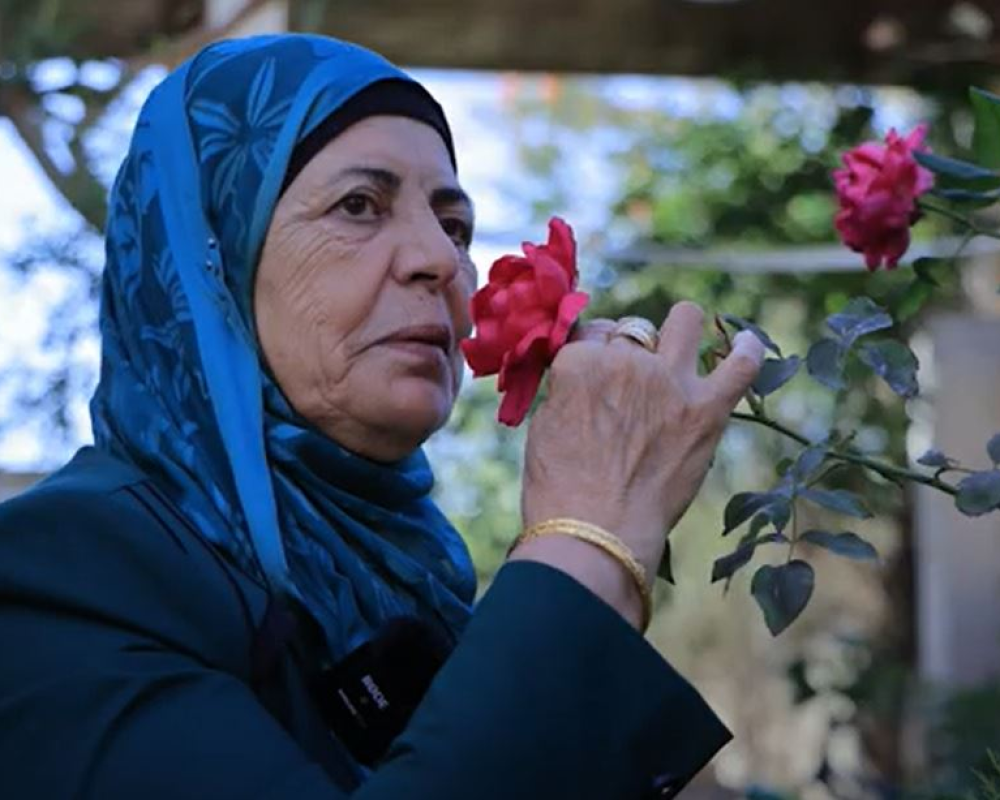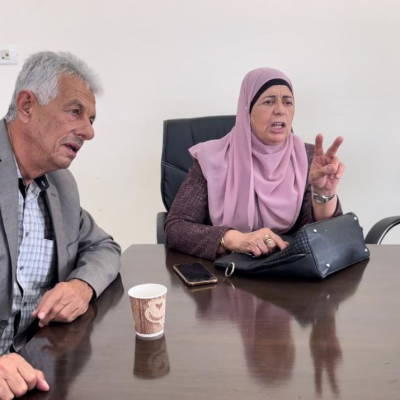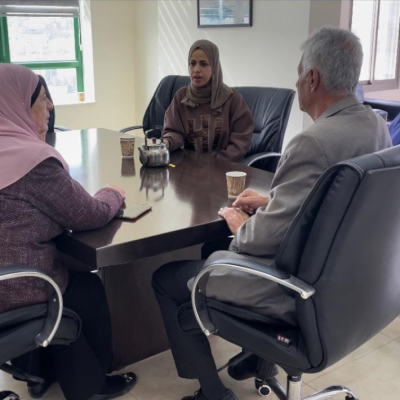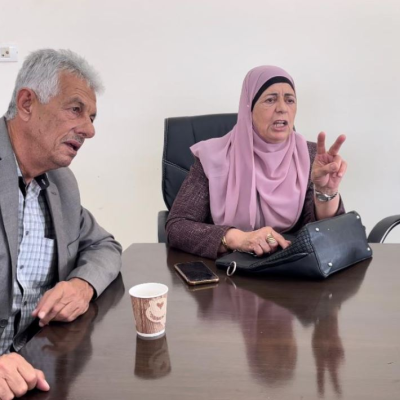
Bethlehem/PNN/
With these words, Fahmiya Al-Araj, a 70-year-old woman, begins her explanation that advancing in age and retirement does not mean sitting at home. Instead, there is a life of continuous giving in service to the community and family.
Fahmiya or UM Majdi, emphasizes that despite her old age, she does not consider it a reason to stay at home. Instead, these years can be the most beautiful in life through giving and serving the surrounding community and family, which is what she happily engages in.
Fahmiya says that after her retirement, she volunteered in more than one place. She served for years as the head of the Parents' Council to monitor the conditions and reality of the schools of the United Nations Relief and Works Agency for Palestinian Refugees (UNRWA) in Aida Refugee Camp.
She also volunteered for the service of the mosque in the camp. Recently, she was elected as a member of the Popular Committee for Services, which acts as the political and service entity for the camp. In the committee, she took on the responsibility for the education and social services sector, and she works to follow up on any issues assigned to her by the committee.
The retired teacher, who worked for about thirty years in UNRWA schools, explains that the situation in the camp has worsened amid the ongoing aggression and brutal war. Therefore, there is a need to increase work and giving. She points out that the committee seeks to provide services to the camp's residents within the available capabilities.
She emphasizes that she has increased her work and tasks, taking on a new role as a researcher by conducting field visits to the camp's homes and meeting with women, especially those requesting assistance amid the siege and war. She visits households, assesses their needs, and writes reports for the committee's leadership to work on providing assistance.
Despite her age, she remains active and stands out among the other committee members.
Saeed Al-Azza, the head of the Popular Committee in the camp, says that Mother Majdi represents a model for Palestinian women capable of giving and working, always presenting herself for the service of the community. He explains that she is one of the most committed and present members of the committee, working to follow up on people's affairs.
Al-Azza adds that despite her old age, Mother Majdi is the most active, pointing out that her prominent role is in the education sector, given her background as a former teacher. She understands the reality of schools and their needs through school visits, meeting with their administrations, and addressing the needs and challenges, working to solve them.

Al-Azza expresses his hope that other committee members, both young and women, will follow in the footsteps of Mother Majdi, as she is the most present and actively involved. He wishes that the rest of the committee members would benefit from her extensive experience in giving and working. Continuous work.
UM Majdi says that recently she has been working on renovating the women's mosque toilets, initiated by a group of mosque women. They relied heavily on her because she is a member of the Popular Committee. They started a voluntary renovation project and were able to achieve it by launching a fundraising campaign. They managed to collect the necessary funds for the renovation after approaching the committee, the camp's institutions, and some donors, including individuals. Mother Majdi sees the completion of the project as an achievement for all women, especially since the renovation project was not a priority.
She emphasizes that illness is not an obstacle but rather a motivation. Mother Majdi expresses gratitude that she was diagnosed with breast cancer years ago, underwent surgery to remove it, and underwent chemotherapy and radiation treatments. She was able to survive it through her will and faith in God. She believes that a significant part of overcoming the disease is psychological, and she will not allow it to control her. Her high spirits contributed to facing the illness and triumphing over it. She has become a source of support for many women who are battling the disease, especially during the treatment period in hospitals. Doctors now ask her to sit with patients, encourage them, and share her experience, which she gladly does. She occasionally gives lectures about her experience, encouraging women and girls not to fear and to confront challenges.
A model for women and young activists
Fidaa Malash, an activist in the camp working on a project to improve the camp's reality, says that Fahima, was her teacher in elementary and preparatory stages. She was a model of an outstanding teacher who was eager to help her students and open up avenues for them.
She added that UM Majdi treated them as friends and always encouraged them to excel and give.

Fidaa adds that she felt the greatest appreciation and respect when she worked with UM Majdi as a member of the Popular Committee. She watched her work with dedication and effort, just as she did when she was a teacher. Since she was young, adding that she has been a role model to be emulated.
A life full of patience and determination from an early age
Fahmiya says that her sense of responsibility and giving started when she was very young. She took on the responsibility of her siblings when her mother fell ill. As the eldest sister, she moved with the refugee family from the village of Al-Walaja in the Jerusalem district, heading to Bethlehem. Her father was a soldier in the Jordanian army and moved to work in several cities.
She carried the burden of her siblings during the 1950s to the extent that her father wanted her to leave school to take care of the family. Still, she insisted on continuing her education. She promised her father to take care of her siblings and continue her studies, which motivated her to work diligently with significant responsibility towards her surroundings. This shaped her character, and she continued her education, excelling in high school.
She entered the UNRWA Teachers' Institute, lived through the struggle and protests condemning the occupation, and felt the responsibility. She graduated with a diploma in teaching mathematics and science and immediately found employment due to her high grades.
Graduating community leaders, Mother Majdi points out that marriage did not prevent her from working. She was serious about balancing work, taking care of her children, and managing her time efficiently, with the help of her husband before his death. She succeeded in both her work as a teacher, moving between various schools, and as a homemaker. She considers her children and their excellence in their studies and work one of the most critical chapters in her life. She managed to send her eldest daughter to one of the world's top universities, Harvard, to become the first deputy in the Palestinian Ministry of Foreign Affairs. Her second daughter completed a master's degree in pediatric care and became the director of nursing in one of the largest Palestinian hospitals. Her eldest son owns a major barber shop in Canada, and she has a journalist son and a doctor son. She believes that through them, she has made her contribution to society.

Planting roses and caring for pets, Mother Majdi mentions her work on her small farm and her love for the land. The garden of her house is her favorite place, where she raises poultry, pigeons, and cultivates the land. She preserves the trees, and the best part of her life is her rose garden, which she works on maintaining and arranging during her free time.
Advice for New Retirees
Fahmiya concludes her conversation by offering advice to both the elderly and the young about the importance of giving and volunteering, especially for seniors after retirement. She emphasizes that this age is the best time to serve the community.
She expresses great happiness in serving the community and encourages others to embark on this experience. She urges them not to succumb to negative ideas that suggest retirement is a time for rest and sitting, waiting for the unknown. On the contrary, she believes that the retirement years are the best for community service.
Fahmiya emphasizes that she feels great joy in continuing to work and contribute to her community, encouraging others to embrace the experience with an open heart and not be swayed by negative thoughts.
This story was produced with the support of the Qarib program, implemented by the French Agency for Media Development (CFImedias) and funded by the French Agency for Development (AFD - Agence Française de Développement).